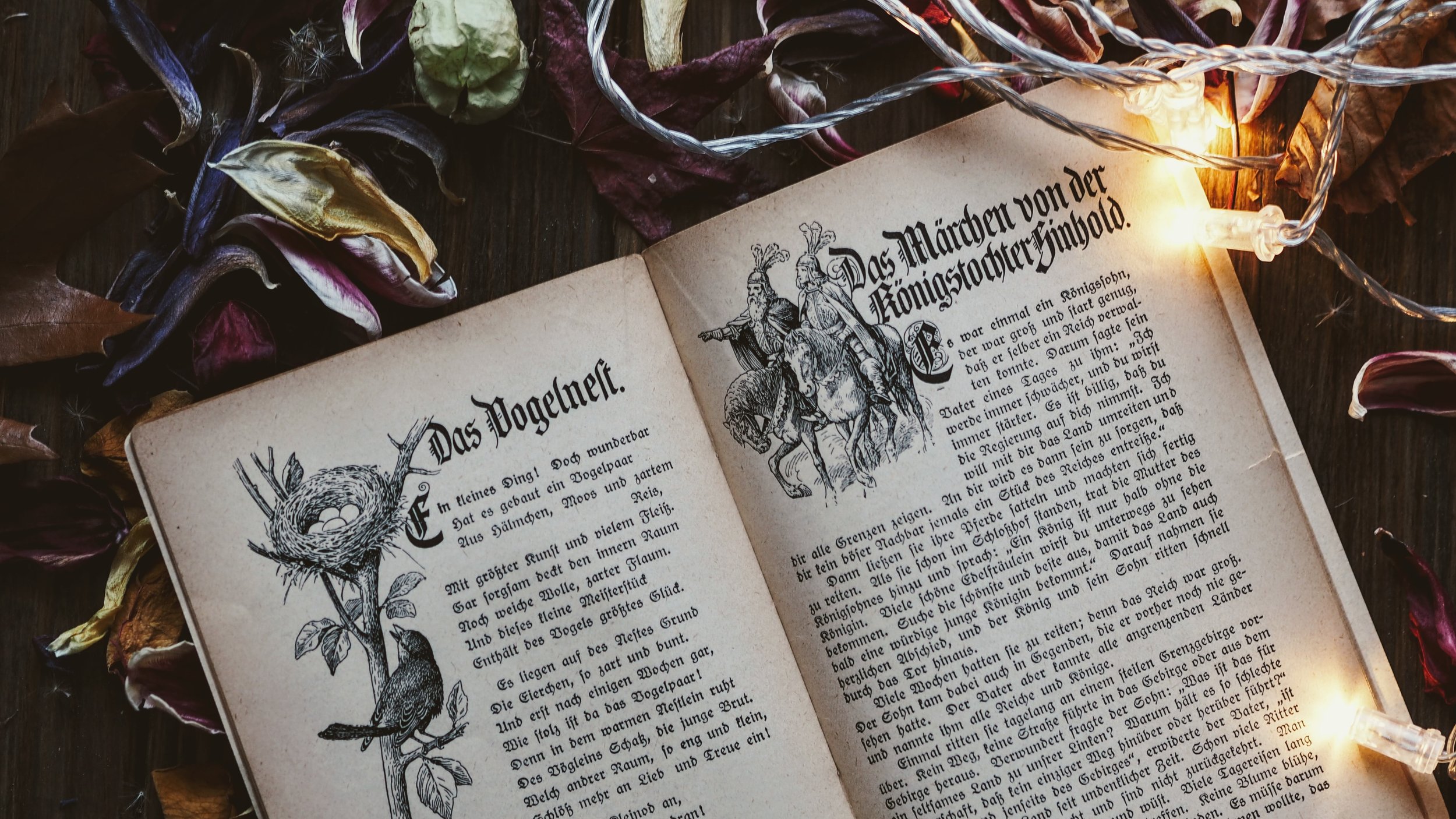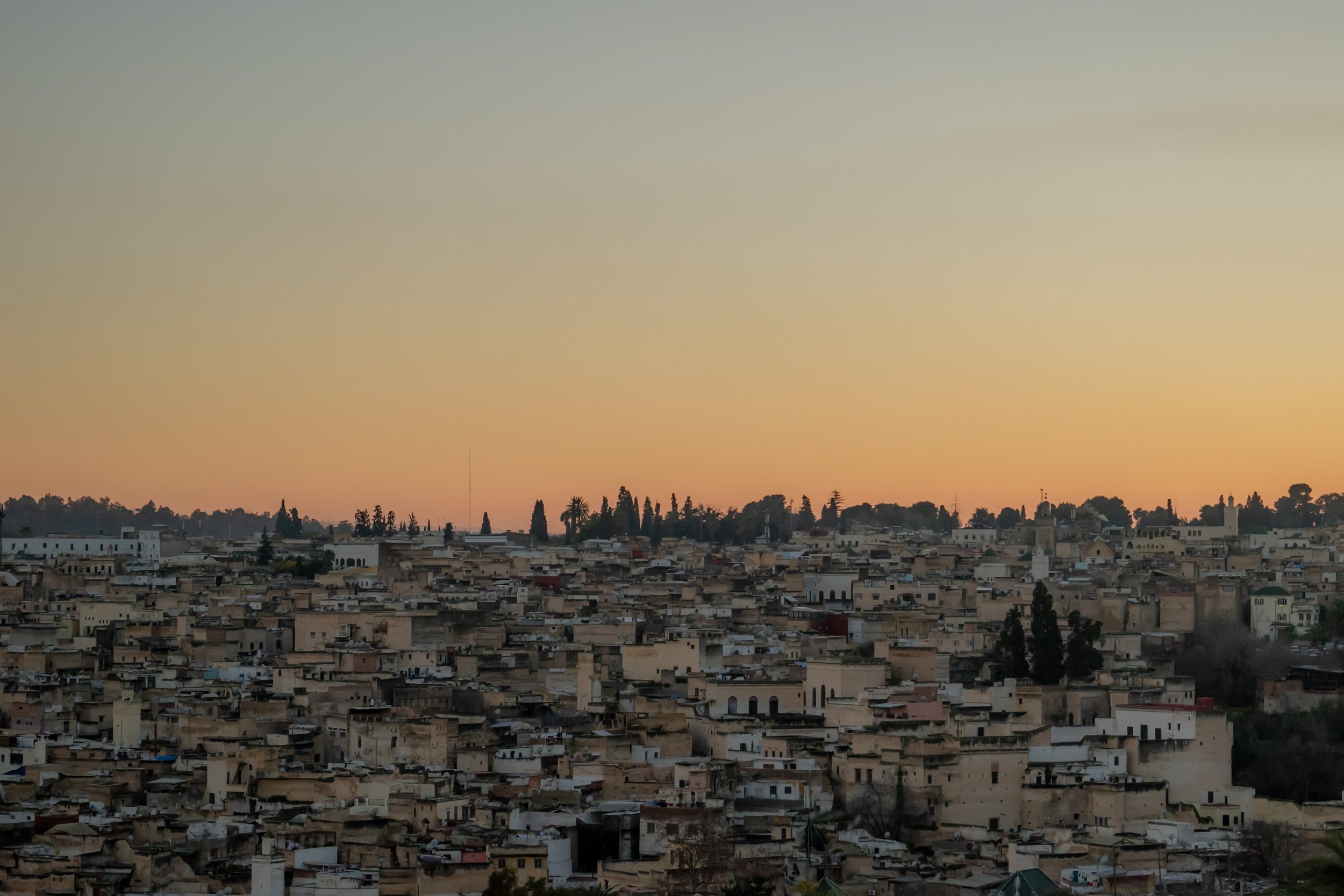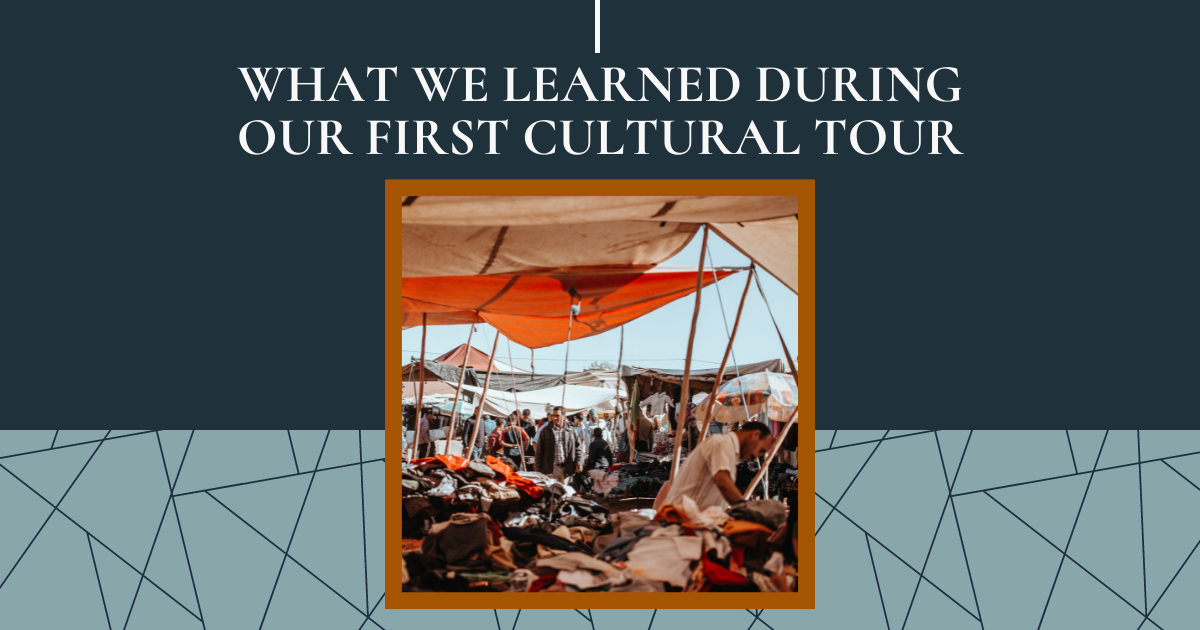Cultural Stories: Lalla Khallal El Khadra
William Gudykunst said, “One of the major factors influencing our effectiveness in communicating with people from other cultures is our ability to understand their culture.” Communication is about more than just the words we say; it is about both language and culture, what we communicate through words and actions. Here at Crossroads Cultural Exchange, we believe that we can't separate learning language from learning culture. As one of out teachers says, "Culture is the spirit of a language."
In my first year of learning Moroccan Arabic, I greatly appreciated that my teachers taught me not only grammar and vocabulary, but also cultural proverbs, teachings, and stories. The stories especially taught me things that were under the surface of Moroccan culture. Now, that same teacher who told me that "Culture is the spirit of a language” has shared with a me a book of Moroccan fairy tales, called Tales of Fes, translated by E. Powys Mathers. Reading and reflecting on the fairy tales, myths, folktales, proverbs, and sayings from another culture help us gain insight into that culture in ways we otherwise may not glean. Let’s look together at one such tale, called Lalla Khallel El Khadra, taken from Tales of Fes.
Lalla Khallal El Khadra
Once upon a time, there was a certain very rich family whose only child was a daughter. The mother died and the girl was placed as an apprentice in the house of a neighbor, that she might be taught embroidery. This neighbor was a wicked and cruel woman and used to load little Lalla Khallal El Khadra with blows. Also, as she herself desired through avarice to marry the widower, she employed the child to prevail upon her father to accept this marriage, promising as a reward that she would no longer beat her.
But when she had gained her end, she was far from remembering what she had undertaken. This vile stepmother had a daughter of her own by her first marriage, who was a gross and ill-educated child, and made dirtiness in her bed; while Lalla Khallal was both charming and intelligent, and as clean as she was pretty. Glory be to Him who created and modeled so fair a creature! Now, in order to alienate the father from his daughter, this unpleasant woman used to saddle her with all the incongruities of her own child.
One day, under pretense of being very amiable with her, she took that little step daughter out into the country. When they had found a patch of shade, they sat down together and the hag began to comb the child's long hair and take the lice from it. As the day was very warm, the patient went to sleep; then her stepmother rolled her long hair about a thorn bush and departed.
During the child's sleep, a certain gazelle, a creature of God, passed by that way, had pity on her, and unwound the hair with his feet. The little girl woke up and saw the gazelle licking her brow. At first she was very frightened, but soon she became accustomed to the animal and lived for many years with him.
Thus she became a young woman, quite as beautiful as the moon, a marvel of creation. One day, as she was going for a walk, she came near a village and, seeing a house which took her fancy, climbed up to the terrace. She leaned over the balcony and could see no one in bousaddar (courtyard); yet the place appeared to be inhabited, for their were various objects of use about the courtyard and carpets at the entrance of the rooms. But there were not even any women there, such as we would expect if the men were abroad.
Climbing down and entering the kitchen, she saw that it was full of great quarters of venison, and game of fur and feather; therefore she understood that the house belonged to hunters. Men, when they live alone, can never take care of their surroundings. If the truth must be told, this house was not in very good order. So the sweet young woman, who loved cleanliness, set herself to wash the whole place, to set the rooms in order, to do the cooking, and to make it all ready for a meal.
Then she hid herself.
Soon she saw seven hunters returning with all sorts of game; and these good fellows were astonished to find their table served and the house in order. Yet, as they were mistrustful, they first made an old dying greyhound eat of the couscous which they found prepared. As the animal did not die, they gaily began to eat, but not without having first said:"Bismillah. In the name of God!”
Next morning all the hunters set out once more, except the eldest, who wished to probe the mystery and therefore send to be asleep. But from Pfening he passed into real sleeping, and Lalla Khallal El Khadra, after she had said the house in order and cooked the dinner, went up to him, stained his right hand and his left foot with henna, and returned to her hiding place.
Next day the second brother, who was trusted to be more successful, stayed behind in his turn; but he also fell into a true sleep and the young girl played the same jest on him. And afterwords the same thing happened with four more of them.
But when the youngest stayed behind under the same conditions, he succeeded in keeping awake, while pretending to sleep, until the moment when Lalla Khallal, after tidying the house and preparing the meal, came up to him. She put henna on his left foot as she had done to the others, but, when she would have painted his right hand, he sees her suddenly by the arm, crying:
“Ins aou jinn? Mortal or of the Jinn?”
“I am a woman of the race of Adam and I say the chahada.”
As she was very beautiful, the youngest hunter fell in love with her and asked her if she would except him as a husband. When she said that she would, he advised her to say to his six brothers, "He who caught me shall marry me."
When the rest returned in the evening, the young man showed them his unpainted right hand, and then introduce them to the girl. All were stricken with amazement at her beauty, and each desired her for himself. But she declared: "He who caught me shall marry me.”
So the two were married, and the whole eight lived together in great happiness; for the other hunters greatly appreciated the sweetness of Lalla Khallal's disposition and the excellent management what she had introduced into the affairs of their house.
One day, while her husband and her six brothers-in-law were hunting, Lalla Khallal heard a Jew crying his wares for women in the street. She recognized him as one Daoud, a wandering peddler from the city where she had been born.
She beckoned to him to come to her, but different trifles from him, and asked him the news of her family. When he had told her that her father and stepmother were still alive, she dismissed him with a little purse full of gold pieces. And the old man hurried to the stepmother and told her where he had found Lalla Khallal. The old woman at once promised him two little purses of gold (for she had laid hold of all the dead mother's fortune) if he would procure her a finger-ring with soporific poison..
Daoud soon returned to the village where he had seen Lalla Khallal, knocked at her door, wished her a good-day, and handed her the ring as a present from her stepmother, exclaiming that the latter was not at all to blame, that she had not lost her on purpose by the thorn bush, and that she grieved for not beholding her anymore.
Well she was preparing the couscous for that night’s meal, the young woman place the ring between her teeth in order that she might mix the semolina with both hands, and immediately fell down unconscious.
As soon as the seven hunters returned they supposed her dead and gave way to great grief.
"The joy of our life is past," they said. "We shall never hear her voice again, we shall no more take pleasure in her tender presence. Our dwelling will lack her valuable cares for evermore. There is no power or might save and God! Such is the Destiny which He had written for us.”
“What are we to do with the body?" asked the youngest, the husband, who was well-nigh dead from his despair. "I can never resign myself to letting so sweet a thing go rotten in the earth.”
Now these seven brothers had a she-camel whose name was N’ala. They dress the young woman's body in all magnificence, covering it with jewels and precious veils, and then placed it upon the she-camel saying to her: "Go forward, N‘ala, go forward ceaselessly; and do not halt unless someone calls you by your name.”
N’ala obeyed, and all the land was soon talking about this prodigy: a she-camel who went forward forever, bearing the body of a very beautiful woman, dress like a queen.
Many tried to catch N’ala, but none succeeded; for no horse could run as fast as she. The Sultan himself could not succeed. Therefore, he promised a great reward to any who should bring that she came off and her mysterious burden into his presence.
"I shall make him rich," he said. “I shall make him in every way as rich as God meant him to be.”
Now a poor harvester was going along a certain road on his donkey, and just at the moment when does she-camel passed him, he dropped his sandal.
“Give me, I pray you," he said to the little ragamuffin, “give me my n'ala.”
Hearing her name, the she-camel halted instantly, and gently allowed herself to be led by the peasant into the presence of the Sultan, who generously rewarded the man.
Lalla Khallal was still sleeping. Her heart did not beat, and no breath raised her breasts.
"She must be buried," said the Sultan, and sent for women to undertake this cast task according to the rites.
These first drew the ring from the place where it still remained between the teeth of the young women, and at once the body sat up, fresh and smiling. In his delight, the Sultan asked first for her story and then for her hand. And she accepted him in the end, for she did not know how she could find her actual husband.
N’ala was put in the palace stable.
One day, Lalla Khallal El Khadra, who could not forget her first love, and did not at all care to share the favours of a single master with a whole harem, resolved to be gone from that place at any cost. Therefore she organized a pleasure party in the Sultan’s gardens with six maids of her honour, bidding them conceal about them anything they valued. All seven hid themselves in a large chest which was put on N’ala’s back, as if it were provision for the excursion. But as soon as they came to the entrance of the garden, Lalla Khallal said to N’ala: “Go forward, N’ala, and do not halt until you reach the door of your masters.”
Thus she discovered the village again and the house of the seven hunters.
“We have forfeited, "they were saying, "all our good luck along with her. And to put a crown upon our greif, N’ala too is lost to us” On hearing her name and the voice of her masters, the she-camel began to utter loud glou-glous of great joy.
The brothers were indeed happy to find their dear Lalla Khallal El Khadra again, when she fell weeping into the arms of her husband. Then she brought the six maids of her honour out of the chest.
“See,” she said to her brothers-in-law, "There are the wives I have brought you."
And she vaunted to the young girls the charm of every woman having a husband apiece.
Questions for Reflection:
In Moroccan culture, the woman, whether she is a mother, wife, or even a young girl, is responsible for the tidiness of the house. For instance, when Lalla Khallal was living with her husband and brothers-in-law, she was in charge of doing all the housework. What do you think about this aspect of Moroccan culture?
This story contains a theme of cleanliness. What do you think this cleanliness means in Moroccan culture? Where else do you see cleanliness in Moroccan culture? What does your culture say about cleanliness?
In this tale, we find that the stepmother represents evil; she tried to harm her stepdaughter, Lalla Khallal El Khadra. This type of contentious relationship is very common in Moroccan culture, where even the word for stepmother in Moroccan Darija, “Mrat Ba,” has a connotation of conflict and misunderstanding. What do you notice about the relationships described in this story (e.g. between Lalla Khallal and her stepmother, between Lalla Khallal and the youngest hunter, etc.)?
Lalla Khallal El Khadra was married to her husband by chance, not due to a love story. The same was also true for the maids she brought with her who married the other brothers. This type of arranged marriage happens often in Moroccan culture. What are your thoughts about arranged marriages and marriages that occur without previously knowing each other?
When Lalla Khallal and her husband got married, they decided to live with her husband’s family. This is common in many Moroccan families, where we can find a couple that lives with parents, siblings, and even grandparents. What are the implications of this arrangement? What are the advantages and disadvantages?
Do you notice any other cultural elements that stand out to you? What questions does this story raise that you would like to discuss with a Moroccan cultural expert?
Do you enjoy this type of cultural exploration? You may enjoy one of our Moroccan cultural workshops, available online or at our center in Fes.
















Morocco is a very unique country for several reasons. The first is its strategic location in the northwest of the continent of Africa, just 14 kilometers south of Europe. This beautiful country is bordered by the Mediterranean Sea in the North, the Atlantic Ocean in the West, Algeria to the East, and Mauritania to the South. For this reason, Morocco is a crossroads where cultures, civilizations, and ethnicities meet.